In .NET, the following statements return different values:
Response.Write(
TimeZoneInfo.ConvertTime(
DateTime.Parse("2010-07-01 5:30:00.000"),
TimeZoneInfo.FindSystemTimeZoneById("Pacific Standard Time"),
TimeZoneInfo.FindSystemTimeZoneById("GMT Standard Time"))
);
// displays 7/1/2010 1:30:00 PM
..and this...
Response.Write(
TimeZoneInfo.ConvertTime(
DateTime.Parse("2010-07-01 5:30:00.000"),
TimeZoneInfo.FindSystemTimeZoneById("Pacific Standard Time"),
TimeZoneInfo.FindSystemTimeZoneById("UTC"))
);
// displays 7/1/2010 12:30:00 PM
Why is this? I thought UTC and GMT Standard Time are equivalent.
Update
Upon further testing, I find that the following appear to be equivalent:
"UTC"
"Greenwich Mean Time"
"Morocco Standard Time"
Whereas, the following is different during summer months:
"GMT Standard Time"
Perhaps my question should be, why are "Greenwich Mean Time" and "GMT Standard Time" different?
End Update
